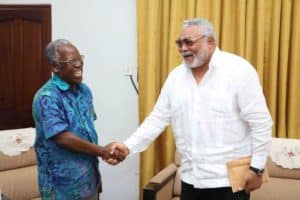Rawlings’ trial by court-martial changed Ghana’s course – Yankah

The trial of Flight Lieutenant Jerry John Rawlings (retired) after the failed May 15, 1979 Military Uprising changed the course Ghana’s socio-political architecture, Mr Kojo Yankah, Founder of the African University College of Communications, has said.
“The June 4 uprising ended the trial during, which period Flt. Lt. Rawlings had a message inscribed on a scroll, which he carried at the trial, which stated the reasons for the revolt.
“It made him more popular because he represented the concerns of many people, not only in the military but among the civilian society. The trial also awakened a lot of consciousness.”
Mr Yankah was speaking to the Ghana News Agency (GNA) in an interview ahead of the musical drama; “Trial of J. J. Rawlings”.
The “Trial of J. J. Rawlings: Echoes of the 31st December Revolution,” was first published in 1986. The second edition of the book, which is being re-launched, is titled “The Trial of J. J. Rawlings” and it is to be performed as a musical drama at the National Theatre on December 31, 2018, showing at 1500 hours.
The performance is going to be repeated from January 3 – 5, 2019
Mr Yankah said the world needed to understand the man J.J. Rawlings, hence the drama.
“The trial stood him out as a courageous person at the time, because here was a young military officer challenging the system, very strong military system and then saying at the trial that leave my men alone.
“I am responsible for everything, it made a strong statement to Ghanaians that, after all it was not everybody who was a coward and that there are people, who are prepared to stand up for justice and to ensure that the rights of the ordinary people are also addressed.”
Responding to critics that the re-launch of the book and musical drama was a public relations spin to detract from the recent documentary “Who killed the judges,” Mr Yankah said “Hmm no – it never crossed my mind”.
Mr Yankah, who served as Editor of the Daily Graphic, which he briefly re-named the People’s Daily Graphic during the early days of the Provisional National Defence Council (PNDC), said “the demand for this book came up way back five years ago, but I was involved in some other things, including the running of my university.
“I retired from the university about three years ago and I started writing and decided to first develop my memoir, after that I said let me go back to this book and so the murder of the judges was another event, so it is purely coincidental, but not a direct response to it”.
He said it would be unfortunate for anybody to conclude that this publication was meant to do damage control for the former President.
“My personal attitude towards the murder of the Judges and the Military Officer was that it was totally unfortunate.
“Something that, I am sure, we will not want to hear or repeated anywhere, but at the same time, I also look at it as part of the process of history”.
Mr Yankah said: “if you really look at that incident in history, you would want to ask yourself, is it because they were judges? There was even a retired military officer who is not mentioned very highly, is it because they were judges? Or was it because of the circumstances under which they were murdered?
“Yes it was unfortunate, we should remember people who are dead, but it was not something that one would say negated whatever gave rise to the uprising in the Armed Forces, which brought ex-President Rawlings to power.
“It does not mean that this reprint or this musical drama is meant to do any public relations damage control for Jerry Rawlings. This is my own way to say let us not forget some part of our history, certain things happened and once we do not remind ourselves of events that happened we could be overtaken by events”.
He said, “In writing this book, I had no influence from former President Rawlings. I only have to go and tell him afterwards as an act of courtesy, but it was entirely my own initiative, so is not like he sponsored this, no this is an entirely private initiative in response to public demand”.
Mr Yankah added: “We put this story on stage to add some entertainment to it. It has musical background. Some ‘jama’ and other things really to tell the circumstances in 1979 that led to the uprising and then the period of the trial up to the morning of June 4, that is what the play is about.
“The whole musical drama is full of entertainment, history, education. It is fun; it is also a reminder of where we have been before, which for me is most important – where we have been before.
“What I am saying is that government officials must listen to the concerns of the people, let’s not forget history. We have this tendency of saying this is a constitutional era, but who ever thought that when we had the highest three military councils with all the weapons in the world, a young officer could shake the system to where we are?
He said ordinary people definitely must be listened to, governance was a practice of serving and, “I am saying that sometimes we forget that we are elected to serve, arrogance has no place”.
“We should control our way of life. Africans we have a simple way of living, we have our traditions, we have our values, which are now gradually being taken over by money.”
The fascinating book titled; “The Trial of J. J. Rawlings,” captures the most intriguing period of Ghana’s history; at the centre of which stands the personality of ‘Junior Jesus’ Rawlings.
Mr Yankah, is an award winning literary author, politician, a professional communicator, journalist and a public relations expert.
Source: GNA
